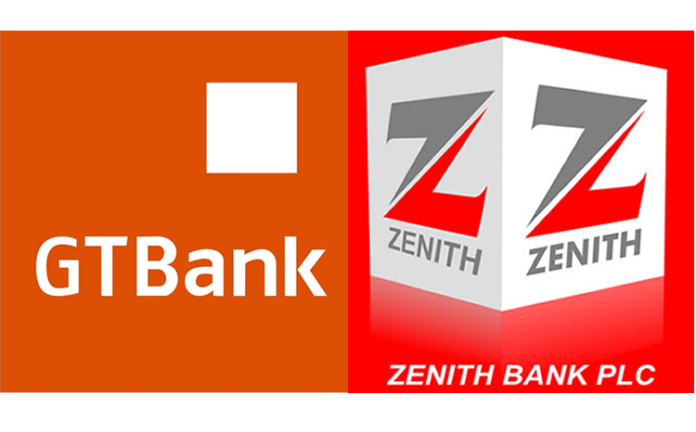Despite Nigeria’s sluggish economy, which grew by only 1.9 per cent in 2018, five of the country’s top Deposit Money Banks (DMBs) posted profits, findings by New Telegraph show.
According to the Full Year 2018 results released by Zenith Bank, Guaranty Trust Bank, Access Bank, United Bank for Africa (UBA) and Stanbic IBTC, the five lenders declared a total of N626.09 billion profits for last year compared with N527.64 billion, which they declared for the 2017 financial year.
This means that compared with their 2017 performance, the banks’ total profits jumped by N98.45 billion or 18.66 per cent last year. New Telegraph’s analysis of the lenders’ FY 2018 results also shows that Zenith Bank declared the highest Profit After Tax (PAT) of N193.42 billion, indicating 11.30 per cent increase over the N173.79 billion it reported for 2017.
The lender was followed by Guaranty Trust Bank, which declared PAT of N184.64 billion for 2018, showing that the bank’s profit grew by 9.96 percentage when compared with the N167.91 billion, which it declared for the 2017 financial year.
Access Bank, which aims to be one of the biggest banks on the continent with its impending combination with Diamond Bank, declared a 58.27 per cent increase in PAT to N94.98 billion last year as against the N60.01 billion the lender declared for the 2017 financial year. Pan African lender, UBA, declared a 2018 PAT of N78.61 billion compared with N77.55 billion, which it reported for the previous year.
Stanbic IBTC, which was the only Tier 2 bank among the five lenders’ results analysed by this newspaper declared a PAT of N74.44 billion for 2018, indicating that the bank’s profits increased by 53.86 per cent when compared with the N48.38 billion it reported for the 2017 financial year. Although the results were generally in tandem with market expectations, Fitch Ratings had, in a report late last year, stated that fragile economic growth in Nigeria was restraining the banks’ growth. Specifically, the global credit rating agency said: “The fragile economic recovery restrains banks’ growth prospects and asset quality.
Operating conditions are still difficult for banks. Despite stronger oil prices in second half of 2018 (H2’18) supporting economic growth, credit demand is weak and banks face pressure on margins and capital.”
According to analysts at Nairametrics, the lenders that have so far announced their 2018 full year results, especially Zenith and Guaranty Trust Bank, were able to report the record high profits that they did, despite the sluggish economy, due to the income they were able to earn from their electronic products. Generally, electronic products refer to income banks generate from online transfers and transactions such as Point of Sale (PoS) and mobile payments. Citing National Bureau of Statistics (NBS) data, which shows that Nigeria’s electronic payment market has a transaction value of about N426 billion per month, the analysts stated that the country’s DMBs see the fast growing e-payment industry as “an area of incremental revenue and have invested billions in this segment of the financial services sector.”
Similarly, analysts at Coronation Research also attributed the impressive profits reported by the lenders in their full year 2018 results to the surge in their non-interest income during the period. According to the Coronation Research analysts, non-interest income is “critical” for banks’ “longterm growth.”
But the sluggish economy continues to cast a shadow over the banking industry because as analysts point out, despite the record profits announced by lenders for 2018, bank stocks have been on a downward trend in recent weeks. Commenting on the issue in chat with journalists, the Chief Executive Officer, Financial Derivatives Company, Mr. Bismarck Rewane, said: “The banking industry is facing some very challenging times because if you look at the results, the revenue profile is growing at a rate of about almost three per cent or four per cent in topline, while the incomes are more from extraordinary income rather than from normal operations.”














